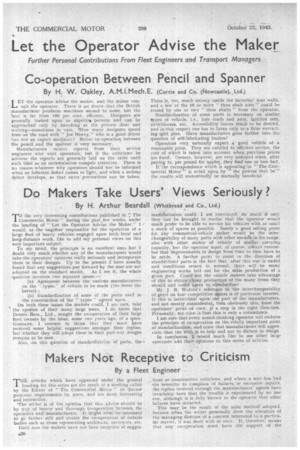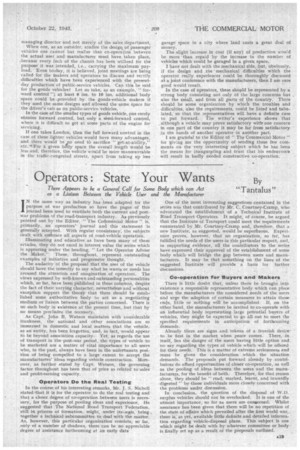Makers Not Receptive to Criticism
Page 22

Page 25

If you've noticed an error in this article please click here to report it so we can fix it.
By a Fleet Engineer TliE articles which have appeared under the general heading for this series are the result of a nieetine° called by the Editor of " The Commercial .Motor " to discuss post-war requirements by users, and are most interesting and instructive.
'The writer is of the ,opinioa that this :advice should be by way of hearty and thorough to-operation. between the operators and' manufacturers. It might evert 'be necessary to go farther still and obtain the co-operation of outside bodies such as those representing architects, surveyors, etc.
Until now the makers have not been receptive of sugges
tions or constructive criticisms, and where a: user has had the temerity to complain of failures or excessive repairs, the replies received through the manufacturers' agents have invariablybeen that the trouble is experienced by no one else, although it is fully known to the operator that other failures have: occurred.
. This may . be the result of the sales method adopted, becausewhen the writer personally drew the attention of the managing director of a concern interested to a particulair matter, it was dealt with at once. It, therefore; means that any co-operation .must have the support of the
managing director and not merely of the sales department.
When one, as an outsider,studies the design of passenger vehicles one cannot but realize that co-operation between the actual user and manufacturer must have taken place, -because every inch of the chassis has been utilized for the purpose it was intended, i.e., carrying the maximum payload. Even to-day, it is believed, joint meetings are being called for the makers and operators to discuss and rectify difficulties which have been experienced with the presentday production of public-service vehicles. -Can this be said for the goods vehicles? Let us take, as an example, " forward control "; at least 6 ins. to 10 ins. additional body space could be provided by the goods-vehicle makers if they used the same designs and allowed the same Space for the driver's cab as on public-service vehicles.
In the case of the smaller types of goods vehicle, one rarely obtains forward control, but only a semi-forward control, where it is difficult to get at some parts of the engine for servicing.
If one takes London, then the full forward' control in the case of these lighter vehicles would have many advantages, and there would be Ito need to sacrifice " get-at-ability," etc. '01--ror a given lab'cly space the overall length would be less and, therefore, the vehicle would be more manceuvrable in the traffic-congested streets, apart from taking up less garage .space in a city where land costs •a great deal of money.
The slight increase in cost (if any) of production would be more than repaid by the increase in the number of vehicles which could be garaged in a given space.
have not dealt with the mechanical side, but, obviously, if the design and the mechanical difficulties which the operator really experiences could be thoroughly discussed at a joint conference with the manufacturers, then I am sure good would result.
" In the case of operators, these should be represented by a strong body consisting not only of the large concerns but also the Small, and from all .parts of the country. There should be some organization • by which the troubles and difficulties, also the requirements, could be listed and tabu, lated, so that the representatives will have a definite case tc; put forward. The writer's experience shows that _althongh a vehicle may prove satisfactory with one concernin one part of the country it may be far from satisfactory • in the hands of another operator in another part.
I am grateful to the Editor of " The Commercial-Motor "for giving me the opportunity of sending these few comments on the very interesting subject which he has been the means for inaugurating and trust that his endeavours will result in badly needed constructive co-operation.




















































